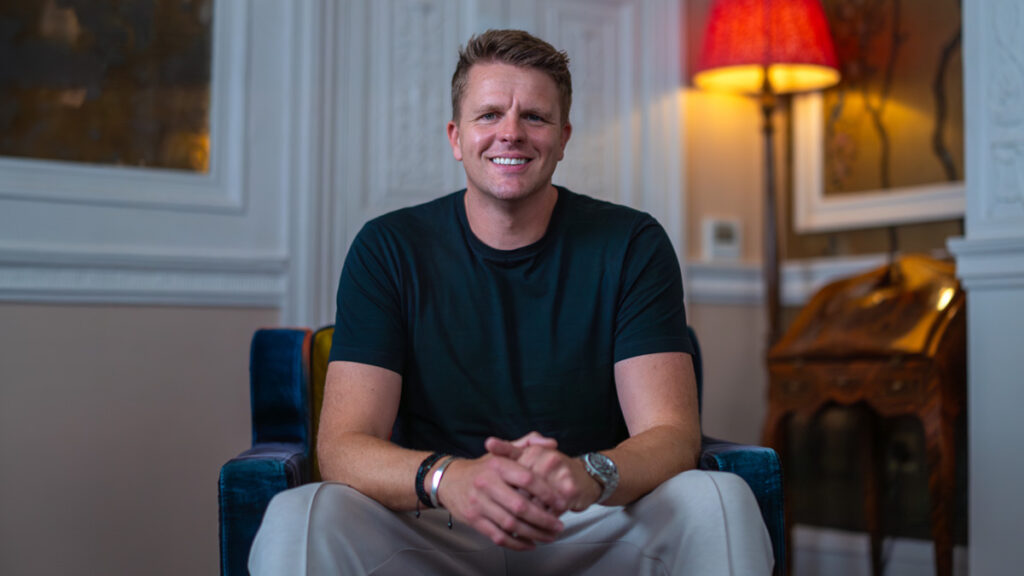Redefining high performance in life and business

High performance. The buzz term du jour on LinkedIn and in the business community. The man who literally has a podcast on the topic has his doubts about whether people actually know its true meaning.
Jake Humphrey is a former BBC and BT Sport presenter and the Founder of the Whisper Group, a multi-award-winning company that has emerged as the standout breakthrough broadcast production company of the last twenty years. Besides changing the landscape of broadcasting, the company has also been named Best Place to Work every year since 2017 and worked with a variety of broadcasters including Channel 4, BBC, BT Sport, and Amazon Prime, and produces content for Formula One, NFL, UEFA, and The Paralympics, amongst others.
Humphrey’s podcast is a chart-topping smash hit that has evolved considerably since its launch in 2021. Hosting the podcast alongside Prof. Damian Hughes, the pair speak to some of the planet’s most notable high performers and turn them into life lessons applicable to anyone.
In this exclusive interview, we talk to Jake about failure, imposter syndrome, why high performance may not mean what you think it means, and much more.
Watch our exclusive interview with Jake Humphrey
Could you give us an overview of your career?
I’m a very normal guy from a small village in Norfolk. I was a middle child of three, my mum was a teacher, and my dad was a charity worker. I describe myself as being so normal because it was almost boring growing up. I wasn’t awful at school, but I didn’t excel, I wasn’t on any sports teams, and I didn’t do any acting or any drama. I almost floated through in those early days. I did okay in my GCSEs and then I failed my A-levels… and this is where luck comes into play.
I think it’s important that we talk about this because there’s so much toxic messaging out there about people who are successful. All they want to share on their Instagram or LinkedIn is, “look how hard I worked. Look at my abilities. Look at my sacrifice. Look at my talent.” The truth is that without luck, none of us are successful. When I failed my A-levels, I went back to school to retake them. On the day I returned, a local TV company sent a letter saying that they were looking for people to go and help out on a TV show. I messed up my exams, all my mates were at university or going travelling around the world, so I went for it.
The company was Rapture Television and I started working there whilst I was retaking my A-levels. I had a place at university, but I took the leap to not take that place and I went to work at the station for about £5,500. That job led to CBBC, which led me to get an opportunity as a Formula One presenter. I distinctly remember feeling that that was a step too far for my talents and my abilities as a broadcaster. Although I was excited to do it, I remember standing in the pit lane in Australia in 2009, in my late 20s and hearing the famous BBC Formula One theme of The Chain by Fleetwood Mac in my earpiece. My boss had said to me beforehand that everybody would make their minds up about you as the new face of Formula One in about 10 seconds. In that moment, I remember thinking to myself that I was only there because I failed my A-levels.
That was a grounding and nice moment for me that I still carry that with me now. I then moved to BT Sport after that. Again, my boss said to me a few weeks before we launched that BT had paid £1bn for the rights to the football and it all rests on my shoulders. What grounded me was that thought – I’m only here because I failed my A-levels. While I was at Formula One, I set up a production company called Whisper, which is now called Whisper Group. It’s got 300+ staff, turning over tens of millions of pounds a year and is a purpose-driven content creation business. I’m only doing that because I failed my A-levels. Just before Covid-19, we created the High Performance podcast, which has grown to be so much more than just the podcast, and I’m only doing that because I failed my A-levels.
You mentioned that you’re someone who suffers from imposter syndrome. Do you have tips for people who may be in situations as a leader and feel this way?
We’re always told that impostor syndrome is a bad thing. “You don’t want to feel impostor syndrome.” “Don’t be envious of other people’s success.” “Self-doubt is a bad thing.” I would flip all those thoughts on their head. Do you have imposter syndrome when you’re pitching to investors or handling an important account at work? Yes. Now let’s change that context. Do you have impostor syndrome about whether you can cook a ready microwave meal? No… because it’s easy and you don’t really care. The reality is that you don’t have impostor syndrome about things that you don’t care about. It’s time for us to change the language about this sort of stuff. Imposter syndrome is great because it means that you care. Therefore, instead of calling it impostor syndrome, reframe it as “I’m a bit piqued by this.” How fantastic is that? You found something that you care about, you found a bit of purpose and passion.
Envy is another one we need to reframe. It’s so prevalent now and it’s important to think more about it, particularly for people who are starting out on their business journey. It does you no good at all to sit there, scrolling through Instagram seeing other people’s success thinking, “It’s never going to happen to me” and feeling anger. For me, the way to look at envy is to see it like a mark on the map. It’s a thing that you want. You are envious because you care about this. So, you know what? Apply hard work, explore, be optimistic, be dogged, don’t take no for an answer, and be consistent. We’ve had people on the podcast over time who’ve spoken about this again and again because it genuinely works. Easy to say, less easy to do.
Failure is a part of business. Do you have any tips for people going through a tough period in their business lives?
It’s easy for me to sit here and talk about the power of embracing failure, I fully understand that, but again, your reaction to that failure is far more important than the failure. The first thing I’d say is to be kind to yourself. There’s so much toxic messaging out there around this bounce-back culture but sometimes, if you’ve really been through a trauma and your business has either taken a battering or you’ve lost it altogether, give yourself some time… it’s a long journey. Don’t think that you can’t write off six months after it’s happened because you’ll fall behind. That will actually be the most valuable because it will allow you to reset and go again.
People who aren’t in that place struggle with this idea of failure, but it’s about reframing again. If you go to the gym and a PT asks you to bench press to failure, you know that’s where the growth happens, and you understand that next time you’ll be able to go longer and harder… you need to have that mentality about life. We had a brilliant conversation on the podcast with former Nike CMO Greg Hoffman and he said a great line; failure is the price of ambition. Brian Cox says to think like a scientist and try to be proved wrong all the time and try to find that breaking point. Every single thing, good or bad, can teach you something, and you will learn an awful lot more from failure than you can from success.
You also need to separate fault from responsibility… which is quite hard. Loads of things will happen to us in our lives that are not our fault, including the failure of our business, childhood trauma or a difficult relationship with a partner. Just because they’re not your fault doesn’t mean it isn’t your responsibility. Taking responsibility is about taking power. Looking for excuses and looking to apportion blame is about giving up power.
You talk to inspirational people on the High Performance Podcast all the time about mindset. How much do you work on your own positive and determined mindset?
I think I’m really lucky that I have that humble upbringing, being from a small village in Norfolk. I’m lucky that my sister works for the NHS and works like you wouldn’t believe. I’m lucky that my little brother Tom runs a framing gallery in Norwich, and yet he has to fight for every penny that he makes. Everywhere around me there are reminders of who I actually am, so I don’t get carried away when I’ve had a great time on the television, for example.
I think what is really encouraging is that you’re not born with a high performance mindset. Of course, you have innate talents, but there are enough people who throw away their innate talent, and there are enough people who are born with very minimal talent to do incredible things. Why is that? Because our reaction to life is more important than anything. I think the reason why that’s really valuable is because I’m having high performance conversations and recording my podcast on a weekly basis, so I’m constantly reminded about these things. It keeps me honest and stops me from getting carried away. That’s a really strong message. By reading books, listening to podcasts, and speaking to people around you, you can build that mental strength.
Has your perception of high performance changed since starting your podcast?
When I started High Performance, I genuinely wanted people to see you have to work hard and you’ve got to forget all this wishy-washy nonsense, work hard and the results will come. We had the most incredible conversation with Jonny Wilkinson, where he said to us that he thought that struggle, failure, getting knocked down and clawing back up would eventually lead him to success, but all that stuff does is just push you down further leaving you struggling even more.
Why do we celebrate balance in our personal lives but celebrate hustle in our business lives? It just kept bringing me back to the fact that high performance is actually about happiness. It actually led to me questioning myself about the title of the podcast. Why talk to people who don’t have a relationship with their friends or their partner or sacrifice everything they believed in to be successful and put them on a pedestal?
For some people, getting out of bed in the morning is high performance. For some people, walking into a room and having the courage to speak to people is high performance. For other people, building and selling a business for £12bn is high performance. We’re all on our own path here. Comparison is the single worst thing we can do because no matter what you do, I promise you someone would have done something better. There are better podcasts than mine and there are more successful TV presenters, but if I spend my time thinking about them, it will diminish what I’ve achieved.



